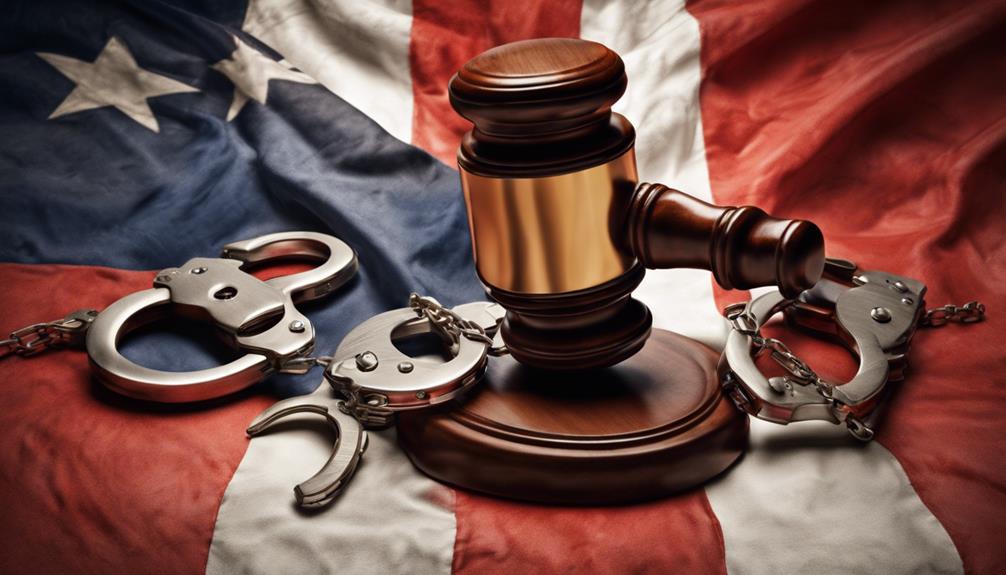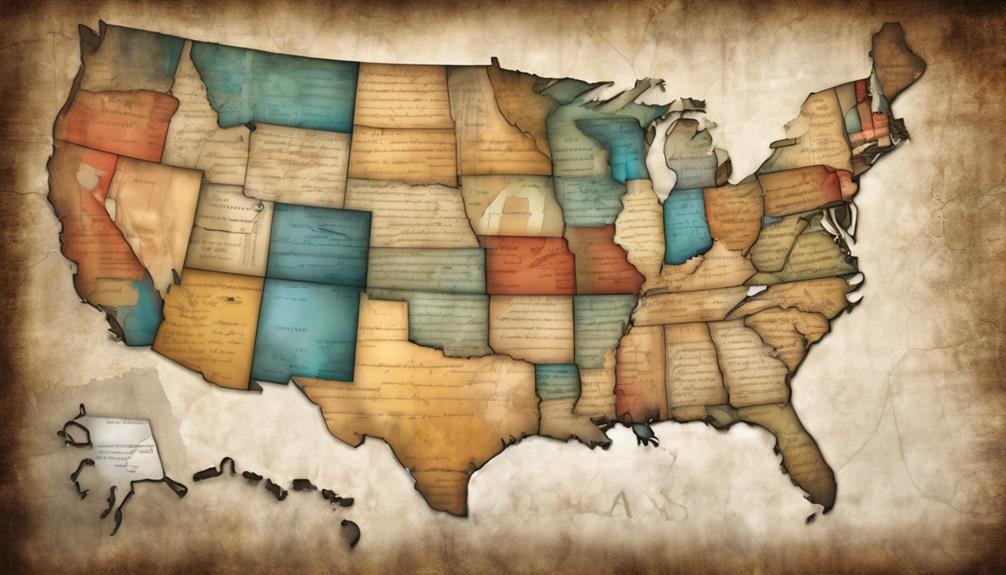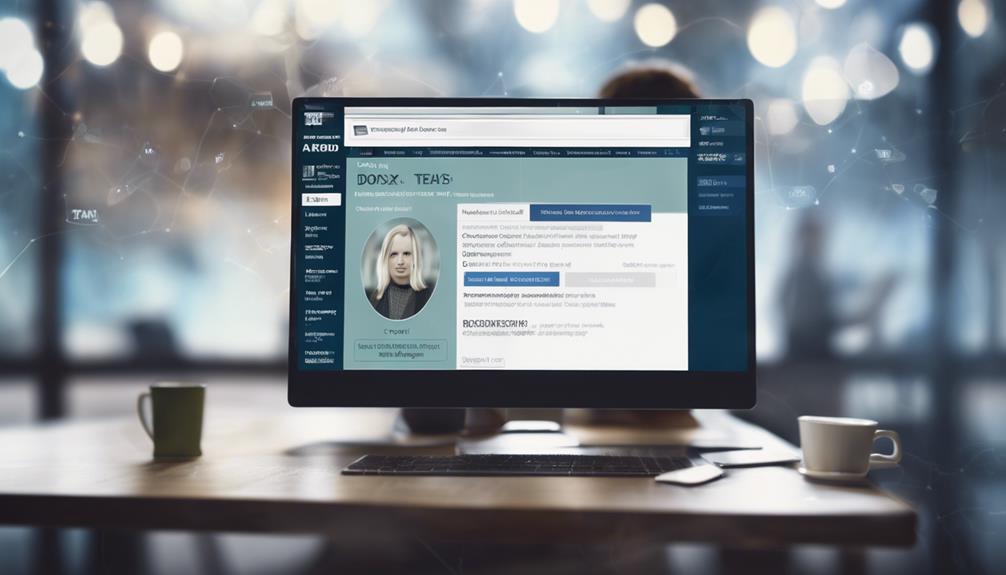Doxxing is illegal in Texas under Section 42.074 of the Texas Penal Code. It is considered a misdemeanor offense, which can result in fines and jail time for those responsible. Texas HB 611 aims to combat doxxing by establishing legal boundaries. Offenders may face additional charges if harm occurs. The law seeks to protect individuals from the critical impact of exposing personal information online. Understanding these regulations is crucial for anyone sharing information on the internet. Familiarizing oneself with the legal consequences and preventive measures can help navigate online interactions safely. More insights on doxxing laws in Texas and related federal regulations are available.
Key Takeaways
- Doxxing is illegal in Texas under Section 42.074 of the Penal Code.
- Classified as a Class B misdemeanor with fines up to $2,000 and 6 months in jail.
- Can escalate to a Class A misdemeanor if bodily harm results.
- Offenders may face harassment or stalking charges in addition to doxxing charges.
- Federal laws like 18 USC 2261A also protect against doxxing, with severe penalties.
Overview of Texas HB 611
Criminalizing the intentional disclosure of personal information for harm, Texas HB 611 aims to combat doxxing by establishing clear legal boundaries. Under this law, doxxing is classified as a misdemeanor offense in Texas, carrying potential fines and jail time for offenders.
The primary goal of Texas HB 611 is to safeguard individuals from the detrimental effects of having their personal information exposed online. To enforce this legislation effectively, collaboration between law enforcement agencies and tech companies is important in combating the act of doxxing.
Legal Consequences of Doxxing in Texas

Doxxing in Texas is deemed illegal under Section 42.074 of the Texas Penal Code effective from September 1, 2023. Individuals sharing someone's personal information, like their telephone number or residence address, on a publicly accessible platform with harmful intent can face legal repercussions.
Here are three key points regarding the legal consequences of doxxing in Texas:
- Classification: Doxxing in Texas is considered a Class B misdemeanor, punishable by a maximum of six months in jail and fines reaching up to $2,000.
- Severity Increase: If doxxing results in bodily harm to the victim, the offense is elevated to a Class A misdemeanor, leading to more severe penalties.
- Additional Charges: Apart from the specific charge of doxxing, individuals may also face related charges such as harassment or stalking, expanding the scope of legal consequences they might encounter.
Comparison With Federal Laws

Federal laws in the United States offer additional protections against doxxing and related offenses, complementing state-specific regulations like those in Texas. Laws such as 18 USC 2261A and 18 USC 119 safeguard individuals from various forms of doxxing. Violating federal laws, especially by stalking across state lines, can lead to severe penalties, including imprisonment and fines.
It's important to mention that disclosing restricted personal information with the intent to incite harm or violence is illegal under federal law. While there isn't a specific federal law targeting doxxing exclusively, some states, such as California, Illinois, and Arizona, have enacted laws that address behaviors similar to doxxing.
Strategies to Prevent Doxxing in Texas

To safeguard personal information and reduce the risk of being targeted, individuals in Texas can implement various strategies to prevent doxxing.
- Set social media accounts to private mode and limit sharing personal information.
- Use services like DeleteMe to opt out of data brokers and remove personal information from online platforms.
- Be cautious about sharing addresses or phone numbers on public platforms.
Implications of Doxxing on Privacy and Free Speech

Individuals in Texas must carefully consider the implications of disclosing personal information online, as it can have significant repercussions on both privacy and free speech rights.
Doxxing poses serious privacy violations and can jeopardize individuals' safety in Texas. The act is now illegal under the new Texas law, leading to potential fines and even jail time for offenders.
Balancing privacy concerns with the right to free speech is important when addressing the consequences of doxxing. This law aims to protect individuals from online harassment and the malicious disclosure of personal information.
Understanding the impact of doxxing on privacy and free speech is essential for responsibly maneuvering online interactions in Texas. By being aware of the potential risks and legal ramifications, individuals can help safeguard their privacy and uphold their right to free speech in the digital domain.
Frequently Asked Questions
Is Doxing in Texas Illegal?
Doxing in Texas is illegal if it involves sharing personal information with harmful intent. Section 42.074 of the Texas Penal Code addresses this, starting September 1st, 2023. Offenders face a Class B misdemeanor charge, including jail time and fines.
Is Posting Someone's Address Illegal Texas?
Posting someone's address without consent in Texas is illegal. Doing so with malicious intent can lead to criminal charges. The Unlawful Disclosure of Residence Address or Telephone Number law prohibits such actions and can result in a Class B misdemeanor charge.
Is Doxxing Actually Illegal?
Doxxing, the malicious act of sharing personal information online, is illegal in Texas. It encompasses revealing addresses or phone numbers with harmful intent. Offenders can face a Class B misdemeanor charge, carrying penalties of up to six months in jail and a $2,000 fine.
What Is the Intimidation Law in Texas?
The intimidation law in Texas, under Section 42.072 of the Penal Code, defines stalking as behavior causing fear of death or harm, a third-degree felony. It can lead to 10 years in prison and $10,000 fines.
Conclusion
To summarize, doxxing is illegal in Texas under HB 611, with potential legal consequences for those who engage in this harmful practice. Just like how a thief can be caught red-handed, doxxers can face serious repercussions for invading others' privacy.
It's important to remember that online actions have real-world consequences, and individuals should be cautious about sharing personal information to protect themselves from potential harm. Stay safe and think twice before sharing sensitive information online.










